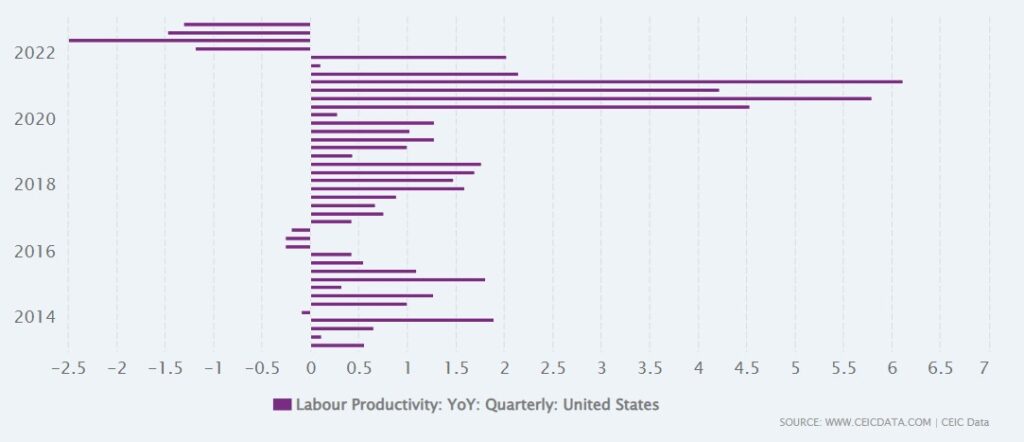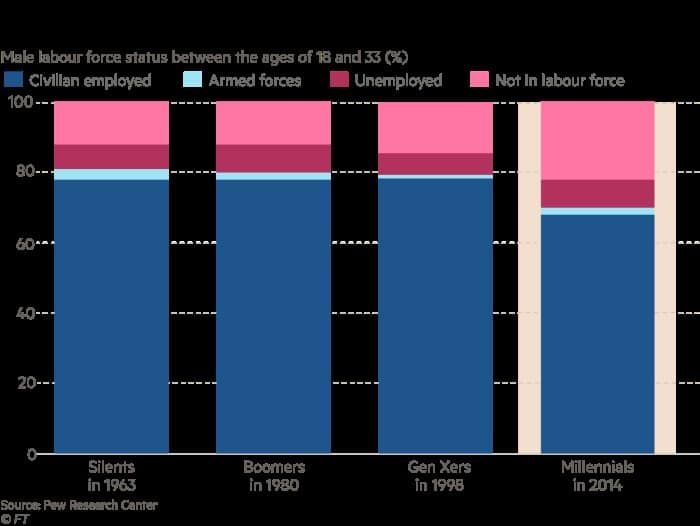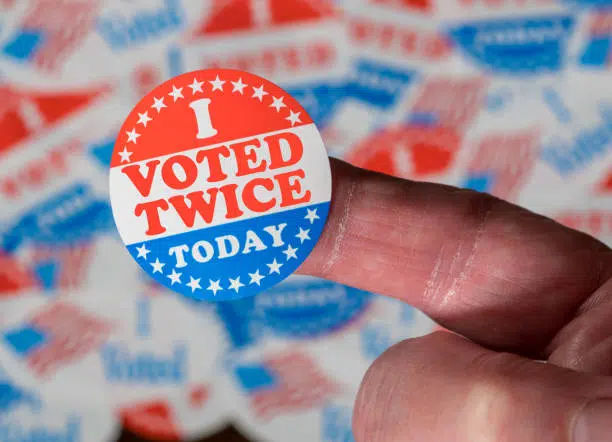
The Tragic Culture of Excuses and Lethargy in Millennials and Gen Z
A country’s future is tied directly to the creativity and work ethic of each new generation as they enter the workforce, and from that measure, America is in serious trouble.
If you take a look at the chart below, you’ll see that labor productivity in the U.S. has declined significantly since the end of the pandemic. Economists attribute the Covid productivity surge to the disproportional loss of lower paying services jobs during that period, which tend to be less productive when compared to higher paying white-collar jobs.

However, it’s worth considering a different explanation. While a large segment of workers in a multitude of industries dropped out and took advantage of the free money Covid payouts, loan payment suspensions and free rent, the brave people who remained in the workforce soldiered on, demonstrating the character represented in those with a natural inclination to work if they are able. If you look at the issue from that perspective, it’s easy to explain the productivity spike during those times.
Millennials and Gen Z Finally Return to Work
Millennials and Gen Z have given rise to new work trends, all of which are anti-productivity. The purpose of “quiet quitting,” “lazy girl jobs” and “bare minimum Mondays,” is to express the employees’ dissatisfaction with their job by doing less work.
It’s no coincidence that overall productivity tanked as soon as the pandemic and the free money giveaway ended. Regrettably, many younger workers were raised in the age where everyone got a trophy and participation medal regardless of how they performed individually or collectively in the game. Somehow, instead of focusing exclusively on better ways to sell or make something, Millennials and Gen Z talk of nebulous concepts like “work-life balance,” as explained in a piece by Sandsheep Sinha in Business Today:
Organizations that understand and address the inner wellness needs of their employees are the ones that will succeed in this emerging landscape of the future of work.
“The future of work is here with a new-age workforce driven by meaning and purpose. Holistic wellness will play a significant role in shaping this purpose-driven work landscape with millennials and Gen Z, not afraid to settle for anything less than a balanced work-life that adds meaning and a sense of fulfilment to their existence.
“Success will not be measured in dollar value alone, but also in the ability to experience the bliss of inner peace and content. Education, work, and wellness will no longer exist in silos. The next few years will see these three areas disrupt, grow, and integrate more closely to create a more fluid and holistic new world.
“Organizations that understand and address the inner wellness needs of their employees are the ones that will succeed in this emerging landscape of the future of work.
And there you have it. Work shouldn’t be about making the company profitable. Instead, its primary purpose should be providing fulfillment for the worker.
Yeah, okay…
These Generations are Making Less Than Their Parents
According to a variety of studies, Millennials and Gen Z workers are making about 20% less than their parents did at the same age. Like most unpleasant realities, the left attributes this discrepancy to the 2009 Great Recession, staggering debt loads and racial and economic oppression.
Yet, the chart below tells a different story:

Every generation from the Silents through Gen X maintained a steady level of civilian employment until the millennials in 2014. That’s where we see a significant drop in employment and a substantial increase in the number of people “not in the labor force.”
In other words, a lot of Gen Z and millennials don’t want to work.
The Simple Solution to The Problem
A huge contributor to the malaise among younger generations is the reinforcement they receive from leftists. Using the same tactics employed for years in minority communities, the left preaches a dogma of hopelessness and victimization. We are all naturally wired to blame others before ourselves when facing failure, so, for unmotivated Gen Z and millennials, instead of taking a long hard look in the mirror, it’s much easier to fire up a blunt, drop out, and pop in a video game in mom’s basement.
Remarkably, even some classic leftists are catching on. Recently, none other than Whoopi Goldberg slammed the millennial work ethic, saying this:
“Young people need to know it’s hard. It’s always been hard. It will always be hard. That’s the nature of moving forward. You’re always moving through something. You’re always trying to get where you need to be. I just want you to be realistic and understand, if you want a house, you can’t work a four-day work week. You have to work longer than that.”
Goldberg is right, and a dose of reality for these two lost generations is long overdue. No one wants a recession, but we’ve experienced a prolonged period (outside the pandemic) of too many jobs chasing too few workers. Perhaps if these young adults lived through a severe recession, they would understand the value and privilege of having a job when there are a 100 unemployed people waiting in line to take it from you.
In the meantime, the advice is simple. Young workers need to understand that it is not an employer’s responsibility to fulfill an employee’s “work-life” balance. In all honesty, most employers don’t really care about you personally. As an employee, you’re there to fulfill one mission: make your supervisor’s life easier. The second an employee starts introducing aspects of their personal life into the workplace and expressing expectations for reduced hours, more time off, yoga training and spirituality workshops, the employer is silently looking for a replacement.
Facing up is tough, but here it is: Employees are a unit of labor. Nothing more. The one’s that produce the most earn the most, and they will experience greater rewards outside the workplace as they are able to buy a house, take nice vacations, accumulate cool stuff and sleep soundly at night knowing their retirement is secure.
It’s a tough world, and if you’re not willing to bust your ass, get out of the way because I guarantee there is someone right behind you who is.



